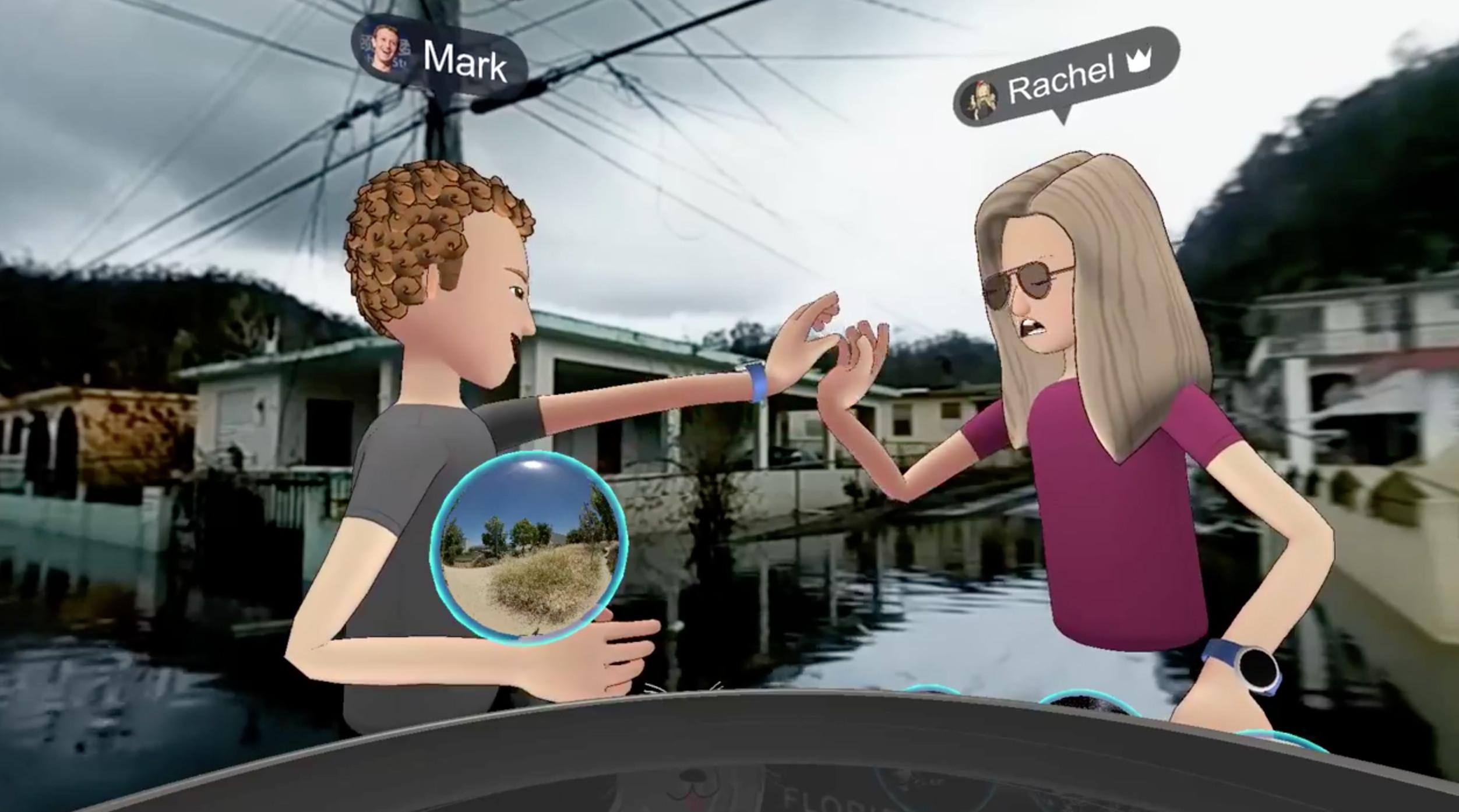On Monday afternoon, Mark Zuckerberg broadcast a Facebook Live video in which he and the company’s head of social virtual reality, Rachel Franklin, appeared as VR avatars atop the roof of one of Facebook’s Menlo Park offices. At first, it appeared to be a harmless attempt to show off a company product and generate hype for Oculus Connect 4, the annual virtual reality developer’s conference that kicked off Wednesday. That is, until Zuckerberg and Franklin transported themselves to a hurricane-stricken Puerto Rico via 360-degree video. They ostensibly stopped by to discuss Facebook’s use of artificial intelligence to help with the emergency response, but the image of two cartoonish figures from a tech corporation splashed against the aftermath of Hurricane Maria, a deadly natural disaster, sparked immediate backlash on social media, prompting Zuckerberg to later apologize. “One of the most powerful features of VR is empathy,” he wrote in a Facebook message. “My goal here was to show how VR can raise awareness and help us see what’s happening in different parts of the world. I also wanted to share the news of our partnership with the Red Cross to help with recovery. Reading some of the comments, I realize this wasn’t clear, and I’m sorry to anyone this offended.”
Still, plenty of questions remain about the appropriate use of VR, and how much tech companies should get involved in world catastrophes. Below, Ringer staff writers and Facebook users Alyssa Bereznak, Kate Knibbs, Molly McHugh, and Justin Charity break down the more problematic aspects of the video.
Alyssa Bereznak: First off, what were your aesthetic impressions? I was immediately struck at how Zuckerberg managed to come off as incredibly awkward—even in VR, where he exists as an avatar whose expressions are designed to appeal to human beings. There was a moment when he and Rachel were high-fiving, and he sorta pulled away too early. Obviously the bigger problem here is that they were doing that against the backdrop of a tragedy à la Newt and Callista at Auschwitz, but I still couldn’t help but notice how uncomfortable he came off.

Kate Knibbs: The cartoon avatars just didn’t work in this VR context, at all. It made the scene look like a tasteless Nintendo Wii game.
Justin Charity: The shaky interactions between Zuckerberg and Franklin, the rotating backdrops, the unclear purpose for “being” in Puerto Rico in the first place—everything about the video distorted my sense of the physical world. That might have been cool if the backdrop weren’t a place currently defined by physical damage to which the Trump administration isn’t paying sufficient attention.
Knibbs: At one point Franklin went, “You can see that we can really feel like we’re here,” and I was like … CAN we? This whole thing reminds me of an accelerated version of Facebook Live’s rollout, when the company seemed to think it would be larkish and then it quickly turned very dark and horrifying.
Charity: I’m sure there are some uses for this tech. Is tourism really one of them?
Bereznak: I remember when Facebook first premiered its social features, it was really into the ideal of experiencing another person's vacation by diving into their photo albums in VR. Maybe it’s a nice way to browse through your aunt's trip to Atlantis Bahamas, but disaster tourism is a whole other story.
Molly McHugh: I was at the Facebook conference earlier this year when they demo'ed this VR tech, and yes, the most fun thing we were able to try with it was jumping into your friends’ photos from their trips. But it was underwhelming. Because you know you’re still just standing on a pad with a headset on. So you get this feeling of “Yeah, Thailand looks amazing ... but I’m here.” Kind of a bummer. Now if you couple that with an island undergoing a huge disaster like Puerto Rico, I don’t understand how that couldn’t be just depressing. Also, the avatars look like those Fisher Price toys.
That being said, after Hurricane Maria hit Dominica, where I used to live, I would have loved to be transported there for about a day just to see what is going on and see what my old house looks like and if the people I know there are safe. And then, because I am selfish, I’d want to come back. But I feel like you need a good reason other than pure voyeurism, right?
Knibbs: Even if Facebook changed the avatars to super-photo-realistic versions of an extra-grim Zuckerberg and Franklin, I’m not sure it would have been that much better. What do you guys think?
Bereznak: No matter what Zuckerberg and Franklin looked like, the video itself felt like a promotional way to show off a new feature. Puerto Rico was just a quick pit stop on the way to the moon (literally, they visited the moon after). And while they were there, they spoke just as much about the merits of VR as they did Facebook's partnership with the Red Cross. If you really want to raise awareness about Puerto Rico, dedicate an entire normal-human video to it.
Charity: It all seems like the 4 millionth example of tech theoretically designed to foster interconnectedness and pan-global harmony instead fostering artifice and emotional closure.
Knibbs: Also, Google Earth already has VR, and it does it without the Uncanny Valley cartoons and this gross promo.
McHugh: One of my best friends, her grandparents were trapped in the Puerto Rico town that put up the “SOS” sign. She was sick worrying about them. She would 100 percent go there in VR to see if they were OK. I guess that’s like … 20 years down the road though, right? Like all she could do now is VR around in 360 photos of the town, not walk up to her grandparents’ door and make sure their house hadn’t flooded. I’m not saying this wasn’t a crass use of the technology we have now, but if it leads to THAT experience, I see better use cases.
Knibbs: That would require a bunch of live camera feeds everywhere though, wouldn’t it? I do think VR with live camera feeds could definitely become a tool for first responders in the future. I don’t know how helpful it would be to wear a VR mask rather than just looking at the video feed, though.
McHugh: Yeah, then we get into some surveillance state questions, but that’s pretty much happening anyway.
Charity: I definitely distrust a future with ubiquitous live video feeds that run through Mark Zuckerberg’s cold veins, though I suppose we’re very nearly there.
Knibbs: I don’t think I ever want to get to a place where you can access anywhere in the world on VR.
McHugh: We are back to describing the plot of The Circle, which happens a lot.
Bereznak: That brings us to another question I had, which is: How do you feel about tech moguls like Zuckerberg and Elon Musk—who recently offered to rebuild Puerto Rico’s power grid using Tesla-made solar panels—rushing in to rescue an island with technology directly related to their companies?
Knibbs: I feel bad about it!!!!!
McHugh: Do you feel worse about the Trump administration doing nothing? It's all terrible. Which is a bad response, but yeah, I don't want Facebook acting as my government.
Knibbs: I’m very grateful that Facebook has made it so easy to donate to reputable nonprofits during crises. And of course anyone doing anything to bring relief is better than nothing. But big picture, yeah, the idea of tech moguls replacing the government is disquieting.
Charity: I think the supposed generosity of private capitalists such as Zuckerberg and Musk is evidence that the federal government would ideally be less stingy about raising and spending money in service of its citizens living better and not dying horrifically. It’s deeply strange that the difference between life and death for Puerto Rico may be Elon Musk. It would be cool if the U.S. had a [working] government.
McHugh: Yes, that. Thankfully, people are stepping up. That they have to is deeply upsetting. And I don't think these companies did it because our government handled it badly. They—Facebook, Musk, etc.—want that position regardless.
Knibbs: The fact that Musk has taken such a central role in potential relief reminds me of one of the arguments I saw against the idea of Zuckerberg running for president. Which is: Do these guys need government positions to assume roles of global leadership?
Bereznak: Yeah, when the U.S. president is just throwing rolls of paper towels into a crowd and two major tech CEOs are deploying AI emergency responses and drawing up plans for rebuilding an entire island’s infrastructure, it’s clear that having a government title doesn't matter much in this situation.
Charity: I’m glad Alyssa brought that image up. Because the contrast between public and private sector that the image of President Donald Trump hurling paper towels invokes is a neat summary of the imbalance. And also a neat summary of how uncanny it is.
Knibbs: Guys, I am really glad we started talking about a PR stunt and are now mulling over how the disintegration of the U.S. government is paving the way for a more entrenched corporate state. Good times.
Bereznak: I don’t know about you Kate, but that’s just a typical Friday night in the Bereznak household.
Knibbs: I will gladly come over for dinner, Alyssa.
Bereznak: You’re welcome anytime.
